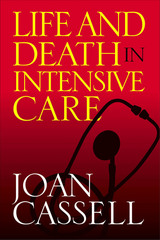5 books about Intensive Care

Intensive Care
Medical Ethics and the Medical Profession
Robert Zussman
University of Chicago Press, 1992
In riveting case studies, Robert Zussman describes how medical decisions in ICUs are considered and reconsidered, made and remade, negotiated and renegotiated. He concentrates on the practice of medical ethics, on the ways in which right and wrong are interpreted and used in the ward—how definitions of right and wrong emerge from the social situations of patients, families, doctors, and nurses and from the workings of hospitals and the courts.
His book is a portrait of the way careful planning is undermined by the unpredictability of illness and the persistence of self-interest, by high principle and curious compromise.
His book is a portrait of the way careful planning is undermined by the unpredictability of illness and the persistence of self-interest, by high principle and curious compromise.
[more]

Intensive Care
More Poetry and Prose by Nurses
Cortney & Judy Davis & Schaefer
University of Iowa Press, 2003

Life And Death In Intensive Care
Joan Cassell
Temple University Press, 2005
Life and Death in Intensive Care offers a unique portrait of the surgical intensive care unit (SICU), the place in medical centers and hospitals where patients with the gravest medical conditions—from comas to terminal illness—are treated. Author Joan Cassell employs the concept of "moral economies" to explain the dilemmas that patients, families, and medical staff confront in treatment. Drawing upon her fieldwork conducted in both the United States and New Zealand, Cassell compares the moral outlooks and underlying principles of SICU nurses, residents, intensivists, and surgeons. Using real life examples, Life and Death in Intensive Care clearly presents the logic and values behind the SICU as well as the personalities, procedures, and pressures that characterize every case. Ultimately, Cassell demonstrates the differing systems of values, and the way cultural definitions of medical treatment inform how we treat the critically ill.
[more]

On the Frontlines of Crisis
Intensive Care and the Challenge of COVID-19
Jason Rodriquez
Rutgers University Press, 2025
On the Frontlines of Crisis is a powerful account of the experiences of healthcare workers during the COVID-19 pandemic. As hospitals worldwide became overwhelmed by an influx of critically ill patients, those working in intensive care units (ICUs) were thrust into an unprecedented battle against a deadly virus about which little was understood. Rodriquez takes readers into the heart of two Massachusetts ICUs to learn about the people who put their lives on the line and faced severe challenges as they treated critically ill patients at the peak of the pandemic.
A dramatic spike in mental health distress among these healthcare workers was a consequence of the pandemic, but was also a result of the changing dynamics within the healthcare system itself. Here, Rodriquez examines the impact of the development of the contemporary focus on “clinical empathy.” This clinical method, while intended to improve patient care, had profound implications for healthcare workers during the pandemic, often blurring the lines between professional distance and personal involvement, increasing the emotional demands on staff and heightened their vulnerability to anxiety, depression, post-traumatic stress, and burnout. Through the personal stories of those who were in the ICU, On the Frontlines of Crisis offers a sobering reflection on the social and emotional costs of caring for patients.
A dramatic spike in mental health distress among these healthcare workers was a consequence of the pandemic, but was also a result of the changing dynamics within the healthcare system itself. Here, Rodriquez examines the impact of the development of the contemporary focus on “clinical empathy.” This clinical method, while intended to improve patient care, had profound implications for healthcare workers during the pandemic, often blurring the lines between professional distance and personal involvement, increasing the emotional demands on staff and heightened their vulnerability to anxiety, depression, post-traumatic stress, and burnout. Through the personal stories of those who were in the ICU, On the Frontlines of Crisis offers a sobering reflection on the social and emotional costs of caring for patients.
[more]

Speaking for the Dying
Life-and-Death Decisions in Intensive Care
Susan P. Shapiro
University of Chicago Press, 2019
Seven in ten Americans over the age of age of sixty who require medical decisions in the final days of their life lack the capacity to make them. For many of us, our biggest, life-and-death decisions—literally—will therefore be made by someone else. They will decide whether we live or die; between long life and quality of life; whether we receive heroic interventions in our final hours; and whether we die in a hospital or at home. They will determine whether our wishes are honored and choose between fidelity to our interests and what is best for themselves or others. Yet despite their critical role, we know remarkably little about how our loved ones decide for us.
Speaking for the Dying tells their story, drawing on daily observations over more than two years in two intensive care units in a diverse urban hospital. From bedsides, hallways, and conference rooms, you will hear, in their own words, how physicians really talk to families and how they respond. You will see how decision makers are selected, the interventions they weigh in on, the information they seek and evaluate, the values and memories they draw on, the criteria they weigh, the outcomes they choose, the conflicts they become embroiled in, and the challenges they face. Observations also provide insight into why some decision makers authorize one aggressive intervention after the next while others do not—even on behalf of patients with similar problems and prospects. And they expose the limited role of advance directives in structuring the process decision makers follow or the outcomes that result.
Research has consistently found that choosing life or death for another is one of the most difficult decisions anyone can face, sometimes haunting families for decades. This book shines a bright light on a role few of us will escape and offers steps that patients and loved ones, health care providers, lawyers, and policymakers could undertake before it is too late.
Speaking for the Dying tells their story, drawing on daily observations over more than two years in two intensive care units in a diverse urban hospital. From bedsides, hallways, and conference rooms, you will hear, in their own words, how physicians really talk to families and how they respond. You will see how decision makers are selected, the interventions they weigh in on, the information they seek and evaluate, the values and memories they draw on, the criteria they weigh, the outcomes they choose, the conflicts they become embroiled in, and the challenges they face. Observations also provide insight into why some decision makers authorize one aggressive intervention after the next while others do not—even on behalf of patients with similar problems and prospects. And they expose the limited role of advance directives in structuring the process decision makers follow or the outcomes that result.
Research has consistently found that choosing life or death for another is one of the most difficult decisions anyone can face, sometimes haunting families for decades. This book shines a bright light on a role few of us will escape and offers steps that patients and loved ones, health care providers, lawyers, and policymakers could undertake before it is too late.
[more]
READERS
Browse our collection.
PUBLISHERS
See BiblioVault's publisher services.
STUDENT SERVICES
Files for college accessibility offices.
UChicago Accessibility Resources
home | accessibility | search | about | contact us
BiblioVault ® 2001 - 2025
The University of Chicago Press









